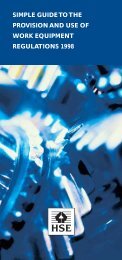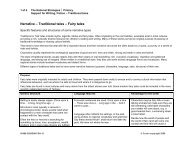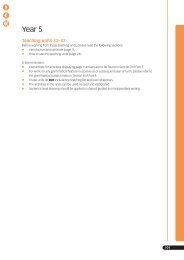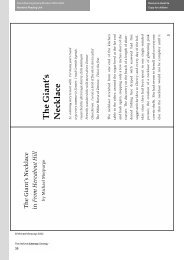Create successful ePaper yourself
Turn your PDF publications into a flip-book with our unique Google optimized e-Paper software.
Points of view …<br />
<strong>Writing</strong> <strong>Flier</strong> 10<br />
Discussion<br />
Throughout the curriculum – and, indeed, throughout their lives –<br />
children will encounter issues on which there is more than one<br />
viewpoint, often fiercely-held opinions. They need help to avoid<br />
making rapid, uninformed judgments, and techniques for reaching a<br />
balanced assessment of the matter in hand.<br />
Controversies may arise, for instance, in<br />
� PSHE, e.g. bullying, smoking<br />
� history, e.g. historical attitudes to race, gender, children,<br />
class, colonialism<br />
� geography, e.g. pollution, effects of development<br />
� science, e.g. space exploration, diet.<br />
Controversy also regularly raises its head during the reading of<br />
fiction, e.g. children’s opinions on an issue may be affected by the<br />
viewpoint of a particular character.<br />
✱ ✱<br />
✱ ✱<br />
✱ ✱<br />
National<br />
Literacy<br />
Strategy<br />
One way of helping children to see more than one point of view is<br />
to compile a for-and-against grid during class discussion. Apart<br />
from the valuable intellectual exercise of listing points on both sides<br />
of an argument, this also provides a reason for pupils to express<br />
their arguments as succinctly as possible – to be condensed into<br />
As pupils become more adept at arguing a point,<br />
intelligible notes for the grid.<br />
controversial issues can occasionally be used as the<br />
focus of a formal debate.<br />
By the upper primary years, pupils should be introduced to<br />
discussion text – the writing of a balanced argument. A completed for-and-against ‘skeleton’ can be used to bring issues<br />
from any area of the curriculum to the Literacy Hour, where teaching can focus on text organisation and language<br />
features.<br />
Of course, discussion is not limited to controversial issues – although polarised views make it easier to teach. For<br />
example, critical evaluative responses to a text may lead to a discussion of subtleties within it.<br />
department for<br />
education and skills<br />
Find out more about discussion<br />
�Further case studies (Y1-Y6) can be found on the NLS website:<br />
www.standards.dfes.gov.uk/literacy<br />
See also pages 154-155, Grammar for writing and Developing early<br />
writing.








